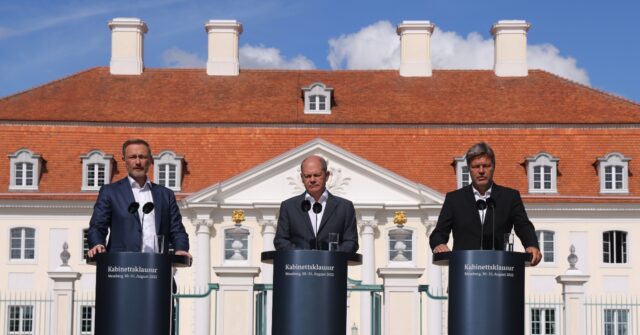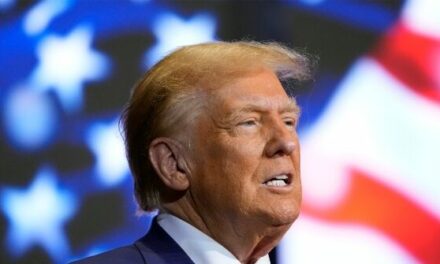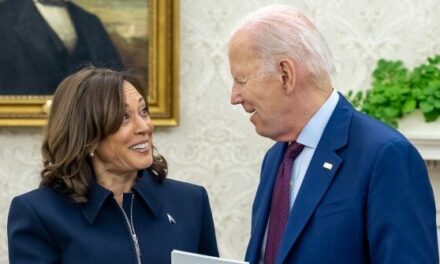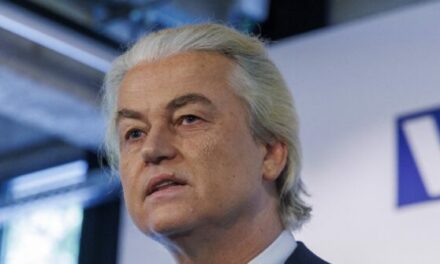We support our Publishers and Content Creators. You can view this story on their website by CLICKING HERE.

The leftist-led coalition government in Germany collapsed on Wednesday evening over budget disagreements, personal spats, and the return of Donald Trump, culminating in Finance Minister Christian Lindner being dismissed and his Free Democrats chucked out of the government.
Nearly three years after coming to power following the retirement of former Chancellor Angela Merkel and the collapse in support for her aggressively open borders Christian Democrat Union (CDU) party, the “progressive coalition” government of Chancellor Olaf Scholz’s Social Democrats (red), Lindner’s Free Democrats (yellow), and Robert Habeck’s Greens (green) finally came to an end this week after months of infighting between the parties over the federal budget, Welt reports.
While clearly there will not be much love lost between Scholz and Lindner — the chancellor having accused his former finance chief of being egotistical, untruthful, and purely politically motivated — the division is fundamentally about differing worldviews and disparate visions for the role of the state.
As reported in the German domestic press, the Traffic Light Coalition era is ending with a “mud-slinging match”.
“He has broken my trust too often. There is no basis of trust for further cooperation. I no longer want to subject our country to such behaviour,” Scholz said. “I would have liked to have spared you this difficult decision, especially in difficult times. Serious government work is not possible like this.”
Scholz admitted that Wednesday’s election of Donald Trump also spurred the government’s collapse. Trump’s return to the White House added to the urgency of having a clear economic stance for the country so that Berlin can show “we can be relied on,” the chancellor said.
The former president has a long history of pressuring Germany to spend more to meet its NATO defence requirements and its overreliance on imported Russian gas to power its economy. These demands caused outrage in Berlin but proved prescient after Russia invaded Ukraine.
Vice-chancellor and leader of the Greens Robert Habeck had attempted in vain to prevent the coalition’s breakup, arguing that Lindner’s dismissal was “unnecessary” and that it would have been better for the government to continue in light of Trump’s return.
However, he admitted that the ‘Traffic Light’ government ultimately proved deeply “unpopular” with the country.
During the past few months of negotiating and wrangling between the “traffic light” partners, Lindner and his pro-business centrist Free Democrats have argued that cutting corporate taxes and reducing government spending is necessary to kickstart the stagnating German economy.
The economy has struggled to recover from the coronavirus lockdowns and the energy crisis sparked by the war in Ukraine. Yet, the anti-industry Greens were unwilling to entertain the notion of cutting business taxes, and the leftist Social Democrats rejected the idea of enacting meaningful spending cuts.
Linder has also recommended cutting new investments into green energy projects and a restructuring of the national pension scheme to reduce the strain on the budget. He accused the two parties of being impractical and failing to recognise the pitfalls of expanding government debt to keep their pet welfare and green energy projects afloat.
Following his dismissal by the chancellor on Wednesday, Lindner also revealed that Scholz had demanded that he agree to suspend the “debt brake”. The constitutionally mandated fiscal measure introduced following the 2008 financial collapse prevents Berlin from adding more than 0.35 per cent of GDP to the debt per year.
“I could not reconcile that with my oath of office,” the former finance minister said, adding: “Olaf Scholz has shown that he does not have the strength to give our country a fresh start… Our country now needs a new direction. We need a new era of growth.”
Although the government collapsed on Wednesday, Scholz’s Social Democrats and the Greens appear set to remain in power from a minority stance for the coming months. The chancellor said that a confidence vote in the Bundestag would be scheduled for January 15 and that elections would be held no later than March.
Rising left-wing populist Sahra Wagenknecht, whose eponymous BSW party may become a coalition partner in a future government following the elections, was heavily critical of Scholz for delaying the vote, accusing him of self interest. “The traffic light coalition has led Germany into a serious crisis. Olaf Scholz should ask the question of confidence now and not wait until the new year. The Chancellor’s timetable is political delaying of insolvency,” she asserted.
“Instead of using this evening to apologise to the citizens for the last three years, the current chancellor gave a self-righteous election campaign speech,” she continued.
“The fact that Olaf Scholz seriously wants to lift the debt brake again in order to increase the funds for arms deliveries to Ukraine and rearmament, while bridges and rails in Germany are rotting and millions of pensioners are living in poverty, shows once again that this government has rightly failed,” said Wagenknecht.
Christian Democrats leader Friedrich Merz — Merkel’s old migration crisis-era party that now insists it has learnt its lessons and will be better on borders in future — says Scholz’ idea of a vote of no confidence being delayed until next year is unreasonable and damaging to the country, comparing the lame duck period it would create as a “Chancellor coma”. Merz is having meetings with other party leaders on Thursday to find a way forward and has said a vote to end the government and possibly call fresh elections should be this week or next at the latest.

 Conservative
Conservative  Search
Search Trending
Trending Current News
Current News 







